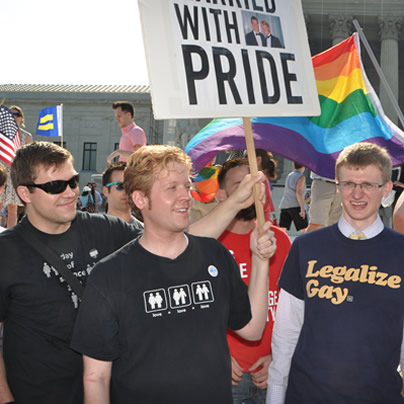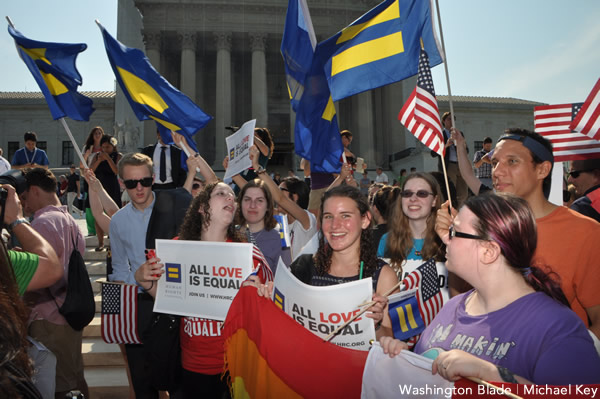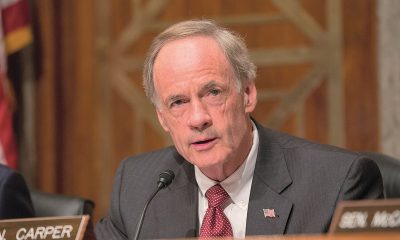Politics
U.S. gov’t to recognize same-sex marriages for tax purposes
Even legally wed couples in non-marriage equality states will be eligible for tax benefits


The U.S. government will treat married same-sex couples as equal in the aftermath of the court ruling against DOMA (Washington Blade photo by Michael Key).
The legal same-sex marriages of gay couples — whether or not they reside in a state that observes their union — will now be recognized for tax purposes in the wake of the Supreme Court decision against the Defense of Marriage Act.
Treasury Secretary Jacob Lew announced the change on Thursday in a joint statement with the Internal Revenue Service.
“Today’s ruling provides certainty and clear, coherent tax filing guidance for all legally married same-sex couples nationwide,” Lew said. “It provides access to benefits, responsibilities and protections under federal tax law that all Americans deserve. This ruling also assures legally married same-sex couples that they can move freely throughout the country knowing that their federal filing status will not change.”
The decision, which brings the Obama administration into compliance with the ruling against DOMA, means gay married couples will be able to file federal taxes jointly each year. The announcement also means married gay couples be treated the same as opposite-sex married couples for income and gift and estate taxes.
These couples, according to the joint statement, will now be treated equally in terms of claiming personal and dependency exemptions, taking the standard deduction, employee benefits, contributing to an IRA and claiming the earned income tax credit or child tax credit.
LGBT advocates applauded the Obama administration for instituting the change, which they said would help bring relief to married gay couples throughout the country.
Evan Wolfson, president of Freedom to Marry, said the announcement makes today “a day of celebration and relief for married same-sex couples all over America.”
“At long last, the IRS will treat them as what they are: married,” Wolfson said. “Freedom to Marry commends the administration’s swift implementation of the Supreme Court’s landmark ruling for federal equality in an area that will have a direct, tangible impact on families’ financial health.”
Chad Griffin, president of the Human Rights Campaign, also praised the Obama administration for implementing the change.
“With today’s ruling, committed and loving gay and lesbian married couples will now be treated equally under our nation’s federal tax laws, regardless of what state they call home,” Griffin said. “These families finally have access to crucial tax benefits and protections previously denied to them under the discriminatory Defense of Marriage Act.”
The issue of unequal federal taxation for gay married couples was the reason why the Supreme Court struck down Section 3 of DOMA. Plaintiff Edith Windsor, a New York lesbian, sued the U.S. government because she had to pay $363,000 in estate taxes upon the death of her spouse, Thea Spyer.
According to the statement, the federal government will now recognize for tax purposes any legal same-sex marriage — even if the couples resides in a state that doesn’t observe the union. However, the new policy doesn’t apply to domestic partnership or civil unions.
Troy Stevenson, executive director of the New Jersey-based Garden State Equality, said the decisions demonstrates why his state needs to enact marriage equality. New Jersey offers civil unions, but not same-sex marriage.
“While this is great news for couples who have been married in the 13 states that recognize full marriage equality; let us be clear, New Jerseyans should not be required to cross state lines to be afforded the dignity of marriage,” Stevenson said. “This decision by the IRS makes it crystal clear that civil unions are not now, and never will be equal to marriage.”
Additionally, gay couples may file an amended return if they feel they would’ve receive a refund in one or more prior tax years still open under the statute of limitations. That means these couples generally can file a refund claim for up to three years in the past: 2010, 2011, and 2012. Under some circumstances, such as signing an agreement with the IRS to keep the statute of limitations open, they may be able to seek a refund from an earlier time.
Further, gay employees who receive same-sex spouse health insurance coverage from their employers on an after-tax basis may treat the amounts paid for that coverage as pre-tax and excludable from income.
Pending legislation in the Senate that would have eliminated the federal tax on employer-provided health insurance for same-sex couples is known as the Tax Parity for Health Plan Beneficiaries Act.
Sen. Charles Schumer (D-N.Y.), the sponsor of the bill, said in a statement to the Washington Blade he welcomes the new policy from the administration, but still seeks passage of his bill cover individuals in civil unions or domestic partnerships.
“Today’s ruling is an important part of implementing the Supreme Court’s historic decision to overturn DOMA,” Schumer said. “I still strongly believe that couples in civil unions and domestic partnerships should receive the same tax treatment as all married couples and will continue to push for exactly that.”
Senior Treasury officials lay out new policy
In a conference call with reporters, senior Treasury officials, speaking on condition of anonymity, laid out the reasoning by which the administration determined that married gay couples living in non-marriage equality states would be recognized for federal tax purposes.
“We have a federal tax code that applies to all 50 states,” officials said. “The thought process was that from tax administration standpoint, it made sense to have rules to apply across the entire nation. So, same-sex couples that are married under federal law in one state should get similar treatment regardless of where they live. On the flip side, from the administration’s standpoint, it would be very difficult to administer a situation it was dependent on where a taxpayer lived on what the state was in that time.”
Officials said the reasoning was analogous to the administration’s previous determination that common law marriages, or some kind of irregular marriage, would be recognized as a union for federal tax purposes.
It’s possible that under some circumstances, married gay couples will have to pay more in taxes than they were paying with DOMA in place. Officials didn’t have an exact number for how many gay couples would pay more in taxes, but expected it would be proportionate to the number of straight couples.
While gay couples may file an amended tax return for up to three years in the past, officials said there’s no obligation to do so — even if they should have had to pay more in taxes under the new policy.
“It’s basically the taxpayers option to that, to go back and file an amended return,” officials said. “There are instances in which a taxpayer would find it advantageous to file an amended return claiming a joint filing status for a previous tax year, but it’s not a requirement.”
In the event that an employer offers domestic partner health benefits to gay employees, but doesn’t recognize same-sex marriage, officials said federal tax immunity would also apply to these benefits. That would be a situation to similar to Walmart, which is set next year to offer domestic partner health benefits to gay employees in same-sex relationships, but won’t recognize same-sex marriages.
Politics
After Biden signs TikTok ban its CEO vows federal court battle
“Rest assured, we aren’t going anywhere,” CEO said

President Joe Biden signed an appropriations bill into law on Wednesday that provides multi-billion dollar funding and military aid for Ukraine, Israel, and Taiwan after months of delay and Congressional infighting.
A separate bill Biden signed within the aid package contained a bipartisan provision that will ban the popular social media app TikTok from the United States if its Chinese parent company ByteDance does not sell off the American subsidiary.
Reacting, TikTok CEO Shou Zi Chew said Wednesday that the Culver City, Calif.-based company would go to court to try to remain online in the U.S.
In a video posted on the company’s social media accounts, Chew denounced the potential ban: “Make no mistake, this is a ban, a ban of TikTok and a ban on you and your voice,” Chew said. “Rest assured, we aren’t going anywhere. We are confident and we will keep fighting for your rights in the courts. The facts and the constitution are on our side, and we expect to prevail,” he added.
Our response to the TikTok Ban Bill in the US: https://t.co/LpoE67sxHo
— TikTokComms (@TikTokComms) April 24, 2024
White House Press Secretary Karine Jean-Pierre adamantly denied during a press briefing on Wednesday that the bill constitutes a ban, reiterating the administration’s hope that TikTok will be purchased by a third-party buyer and referencing media reports about the many firms that are interested.
Chew has repeatedly testified in both the House and Senate regarding ByteDance’s ability to mine personal data of its 170 million plus American subscribers, maintaining that user data is secure and not shared with either ByteDance nor agencies of the Chinese government. The testimony failed to assuage lawmakers’ doubts.
In an email, the former chair of the House Intelligence Committee, U.S. Rep. Adam Schiff (D-Calif.), who doesn’t support a blanket ban of the app, told the Washington Blade:
“As the former chairman of the House Intelligence Committee, I have long worked to safeguard Americans’ freedoms and security both at home and abroad. The Chinese Communist Party’s ability to exploit private user data and to manipulate public opinion through TikTok present serious national security concerns. For that reason, I believe that divestiture presents the best option to preserve access to the platform, while ameliorating these risks. I do not support a ban on TikTok while there are other less restrictive means available, and this legislation will give the administration the leverage and authority to require divestiture.”
A spokesperson for U.S. Sen. Alex Padilla (D-Calif.) told the Blade: “Senator Padilla believes we can support speech and creativity while also protecting data privacy and security. TikTok’s relationship to the Chinese Communist Party poses significant data privacy concerns. He will continue working with the Biden-Harris administration and his colleagues in Congress to safeguard Americans’ data privacy and foster continued innovation.”
The law, which gives ByteDance 270 days to divest TikTok’s U.S. assets, expires with a January 19, 2025 deadline for a sale. The date is one day before Biden’s term is set to expire, although he could extend the deadline by three months if he determines ByteDance is making progress or the transaction faces uncertainty in a federal court.
Former President Donald Trump’s executive order in 2020, which sought to ban TikTok and Chinese-owned WeChat, a unit of Beijing-based Tencent, in the U.S., was blocked by federal courts.
TikTok has previously fought efforts to ban its widely popular app by the state of Montana last year, in a case that saw a federal judge in Helena block that state ban, citing free-speech grounds.
The South China Morning Post reported this week that the four-year battle over TikTok is a significant front in a war over the internet and technology between Washington and Beijing. Last week, Apple said China had ordered it to remove Meta Platforms’s WhatsApp and Threads from its App Store in China over Chinese national security concerns.
A spokesperson for the ACLU told the Blade in a statement that “banning or requiring divestiture of TikTok would set an alarming global precedent for excessive government control over social media platforms.”
LGBTQ TikToker users are alarmed, fearing that a ban will represent the disruption of networks of support and activism. However, queer social media influencers who operate on multiple platforms expressed some doubts as to long term impact.
Los Angeles Blade contributor Chris Stanley told the Blade:
“It might affect us slightly, because TikTok is so easy to go viral on. Which obviously means more brand deals, etc. However they also suppress and shadow ban LGBTQ creators frequently. But we will definitely be focusing our energy more on other platforms with this uncertainty going forward. Lucky for us, we aren’t one trick ponies and have multiple other platforms built.”
Brooklyn, N.Y.,-based gay social media creator and influencer Artem Bezrukavenko told the Blade:
“For smart creators it won’t because they have multiple platforms. For people who put all their livelihood yes. Like people who do livestreams,” he said adding: “Personally I’m happy it gets banned or American company will own it so they will be less homophobic to us.”
TikTok’s LGBTQ following has generally positive experiences although there have been widely reported instances of users, notably transgender users, seemingly targeted by the platform’s algorithms and having their accounts banned or repeatedly suspended.
Of greater concern is the staggering rise in anti-LGBTQ violence and threats on the platform prompting LGBTQ advocacy group GLAAD, in its annual Social Media Safety Index, to give TikTok a failing score on LGBTQ safety.
Additional reporting by Christopher Kane
Politics
Smithsonian staff concerned about future of LGBTQ programming amid GOP scrutiny
Secretary Lonnie Bunch says ‘LGBTQ+ content is welcome’

Staff at the Smithsonian Institution are concerned about the future of LGBTQ programming as several events featuring a drag performer were cancelled or postponed following scrutiny by House Republicans, according to emails reviewed by the Washington Post.
In December, Secretary Lonnie G. Bunch III appeared before a hearing led by GOP members of the Committee on House Administration, who flagged concerns about the Smithsonian’s involvement in “the Left’s indoctrination of our children.”
Under questioning from U.S. Rep. Stephanie Bice (R-Okla.), Bunch said he was “surprised” to learn the Smithsonian had hosted six drag events over the past three years, telling the lawmakers “It’s not appropriate to expose children” to these performances.
Collaborations with drag artist Pattie Gonia in December, January, and March were subsequently postponed or cancelled, the Post reported on Saturday, adding that a Smithsonian spokesperson blamed “budgetary constraints and other resource issues” and the museums are still developing programming for Pride month in June.
“I, along with all senior leaders, take seriously the concerns expressed by staff and will continue to do so,” Bunch said in a statement to the paper. “As we have reiterated, LGBTQ+ content is welcome at the Smithsonian.”
The secretary sent an email on Friday expressing plans to meet with leaders of the Smithsonian Pride Alliance, one of the two groups that detailed their concerns to him following December’s hearing.
Bunch told the Pride Alliance in January that with his response to Bice’s question, his intention was to “immediately stress that the Smithsonian does not expose children to inappropriate content.”
“A hearing setting does not give you ample time to expand,” he said, adding that with more time he would have spoken “more broadly about the merits and goals of our programming and content development and how we equip parents to make choices about what content their children experience.”
Politics
Survey finds support for Biden among LGBTQ adults persists despite misgivings
Data for Progress previewed the results exclusively with the Blade

A new survey by Data for Progress found LGBTQ adults overwhelmingly favor President Joe Biden and Democrats over his 2024 rival former President Donald Trump and Republicans, but responses to other questions may signal potential headwinds for Biden’s reelection campaign.
The organization shared the findings of its poll, which included 873 respondents from across the country including an oversample of transgender adults, exclusively with the Washington Blade on Thursday.
Despite the clear margin of support for the president, with only 22 percent of respondents reporting that they have a very favorable or somewhat favorable opinion of Trump, answers were more mixed when it came to assessments of Biden’s performance over the past four years and his party’s record of protecting queer and trans Americans.
Forty-five percent of respondents said the Biden-Harris administration has performed better than they expected, while 47 percent said the administration’s record has been worse than they anticipated. A greater margin of trans adults in the survey — 52 vs. 37 percent — said their expectations were not met.
Seventy precent of all LGBTQ respondents and 81 percent of those who identify as trans said the Democratic Party should be doing more for queer and trans folks, while just 24 percent of all survey participants and 17 percent of trans participants agreed the party is already doing enough.
With respect to the issues respondents care about the most when deciding between the candidates on their ballots, LGBTQ issues were second only to the economy, eclipsing other considerations like abortion and threats to democracy.
These answers may reflect heightened fear and anxiety among LGBTQ adults as a consequence of the dramatic uptick over the past few years in rhetorical, legislative, and violent bias-motivated attacks against the community, especially targeting queer and trans folks.
The survey found that while LGBTQ adults are highly motivated to vote in November, there are signs of ennui. For example, enthusiasm was substantially lower among those aged 18 to 24 and 25 to 39 compared with adults 40 and older. And a plurality of younger LGBTQ respondents said they believe that neither of the country’s two major political parties care about them.
-

 State Department3 days ago
State Department3 days agoState Department releases annual human rights report
-

 Maryland5 days ago
Maryland5 days agoJoe Vogel campaign holds ‘Big Gay Canvass Kickoff’
-

 Politics4 days ago
Politics4 days agoSmithsonian staff concerned about future of LGBTQ programming amid GOP scrutiny
-

 District of Columbia1 day ago
District of Columbia1 day agoCatching up with the asexuals and aromantics of D.C.












